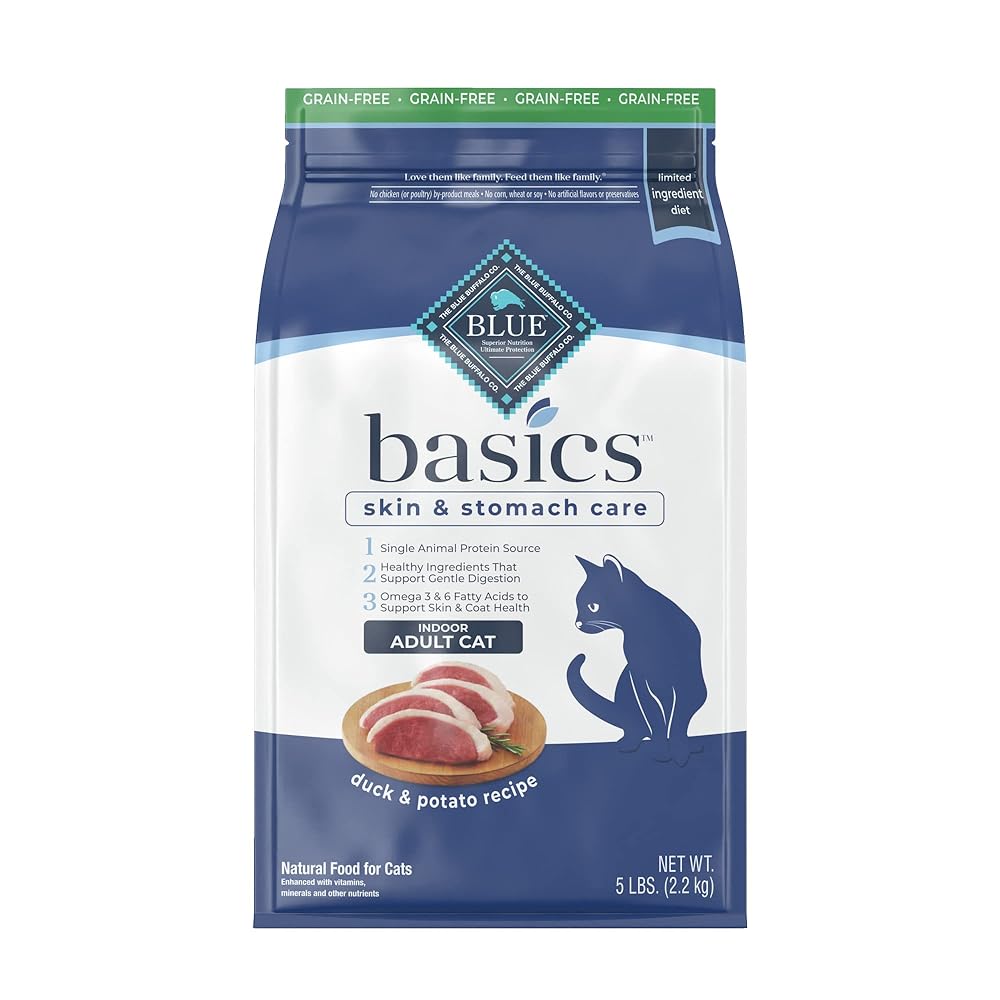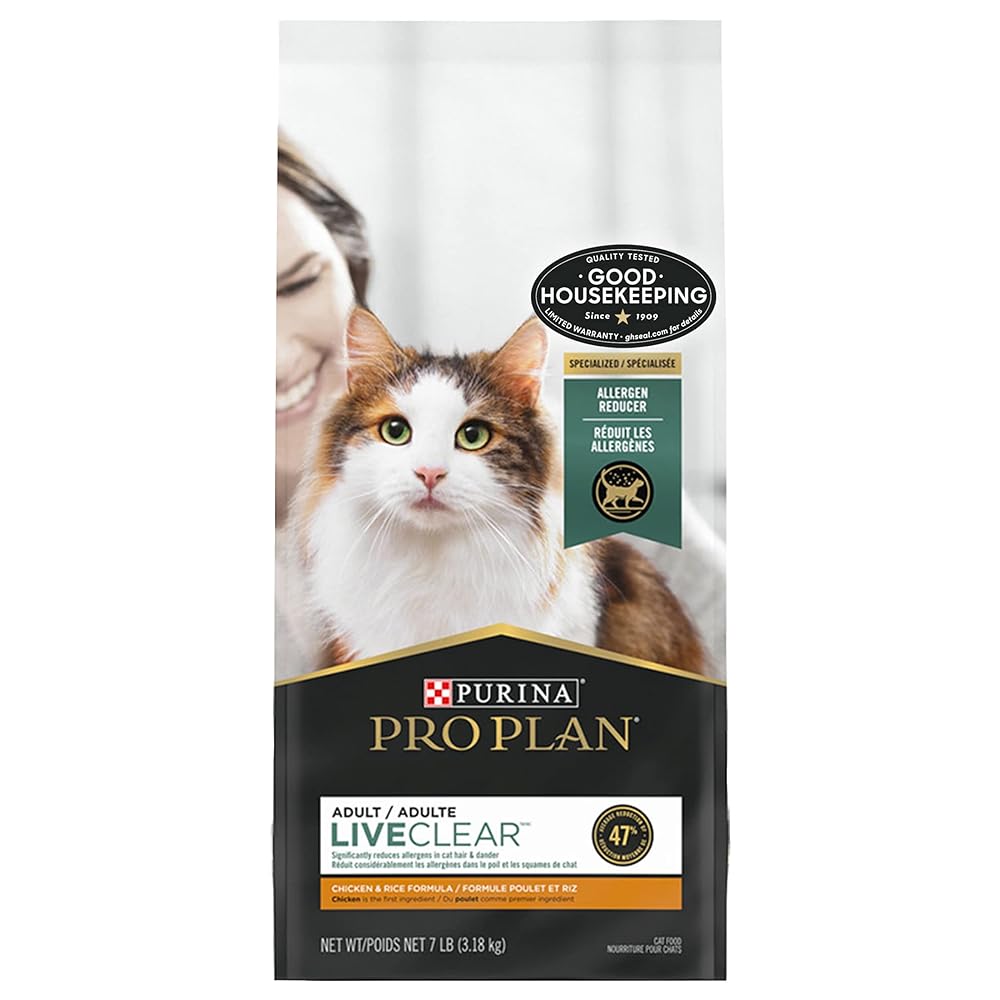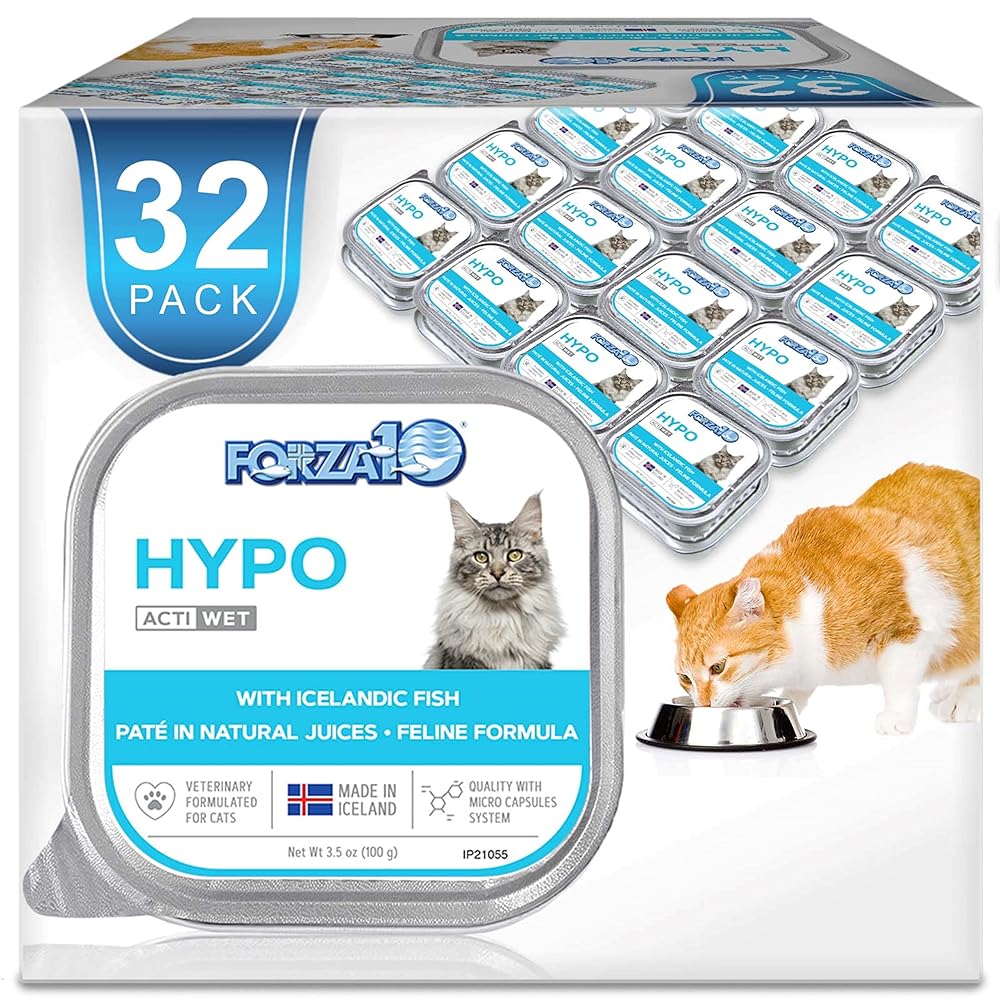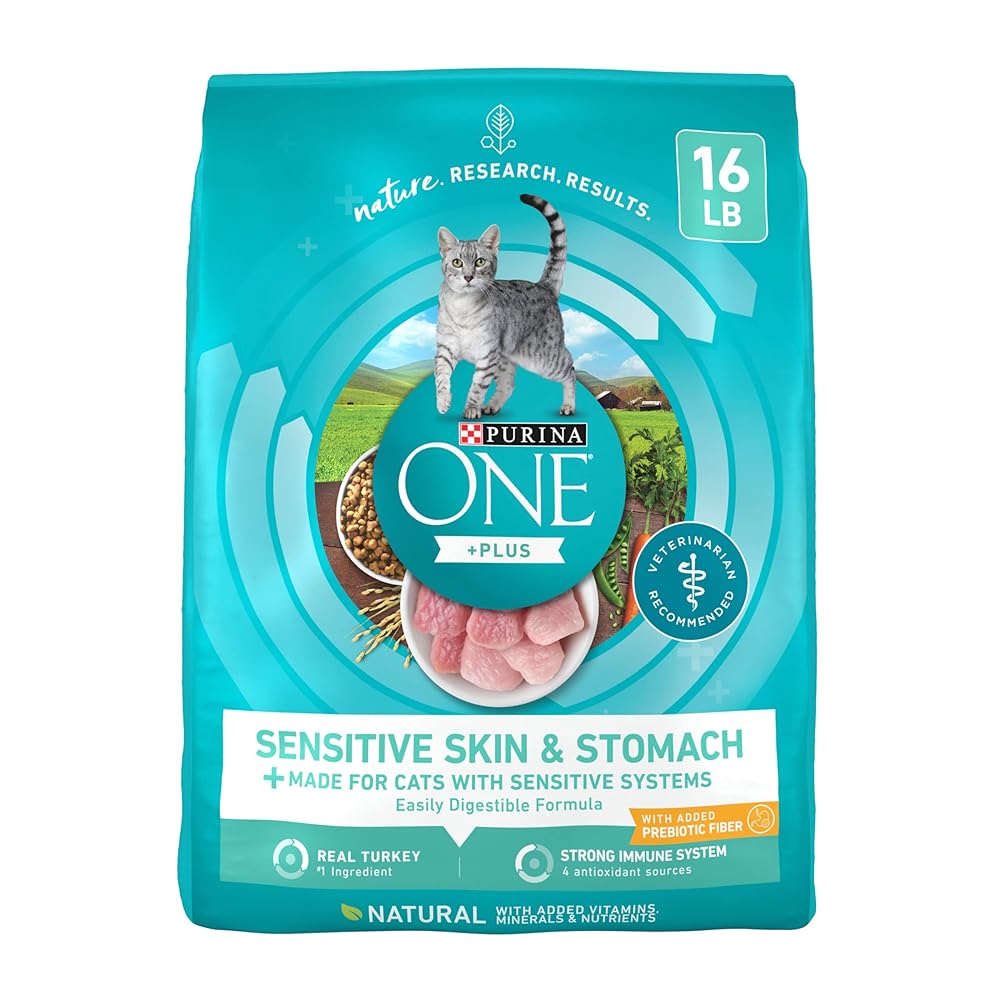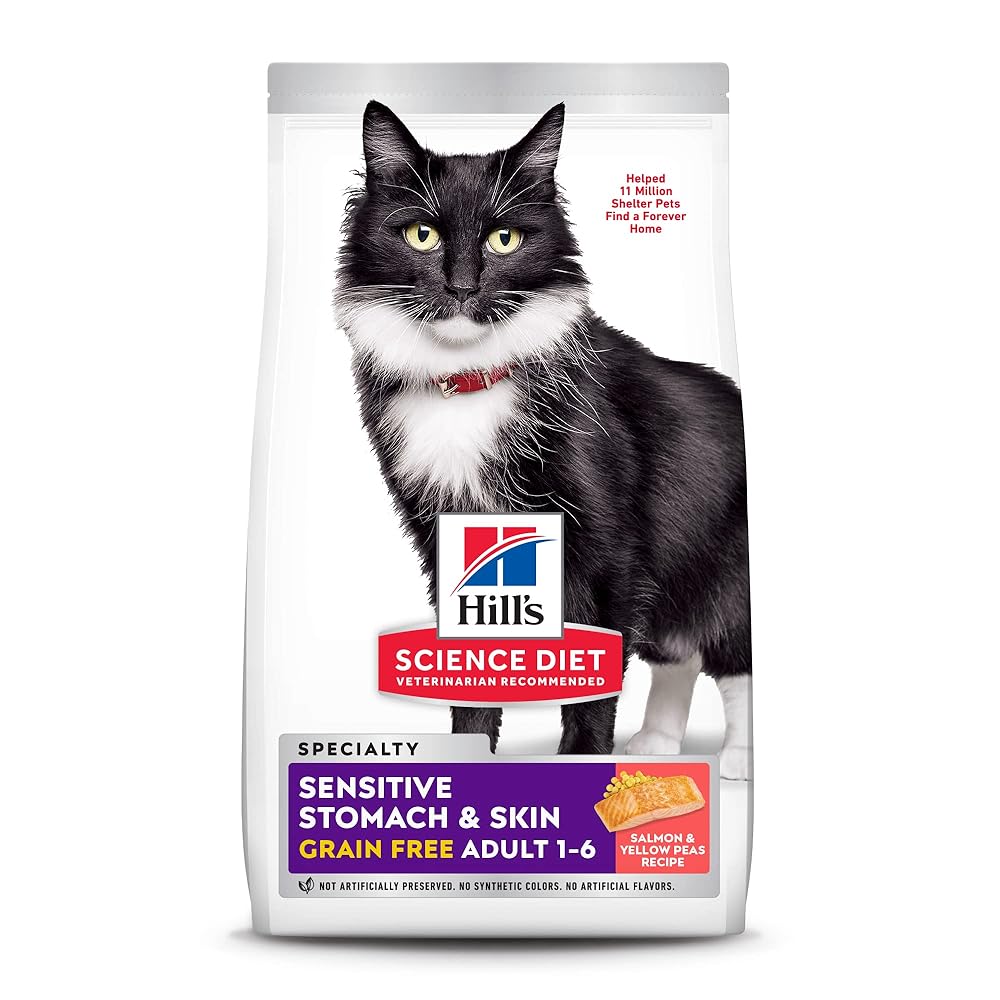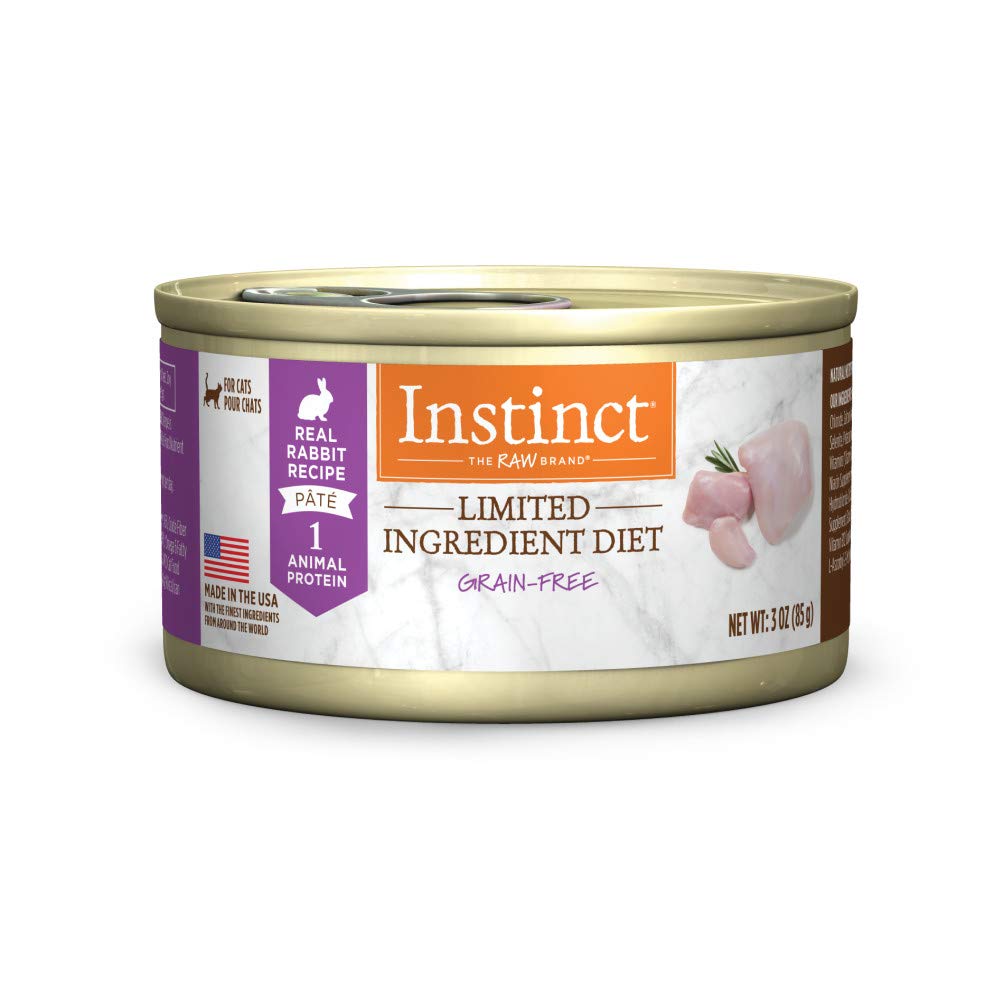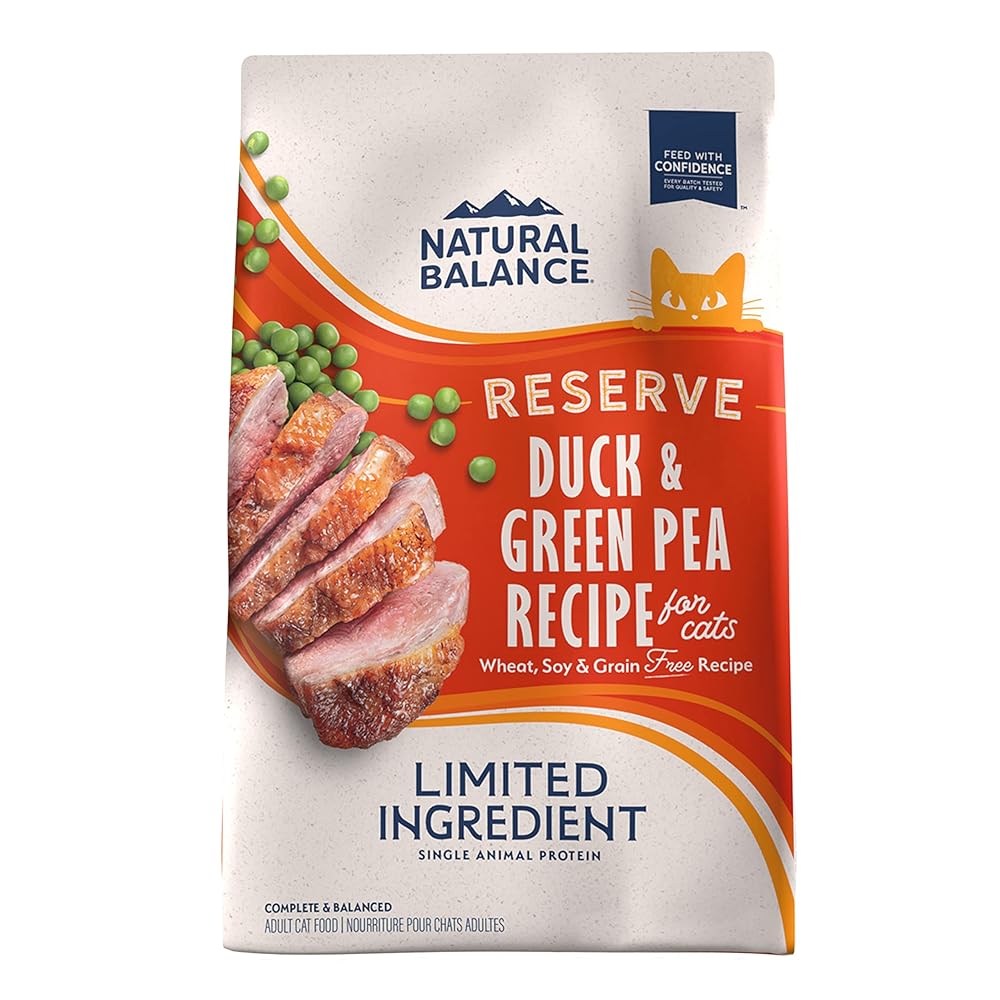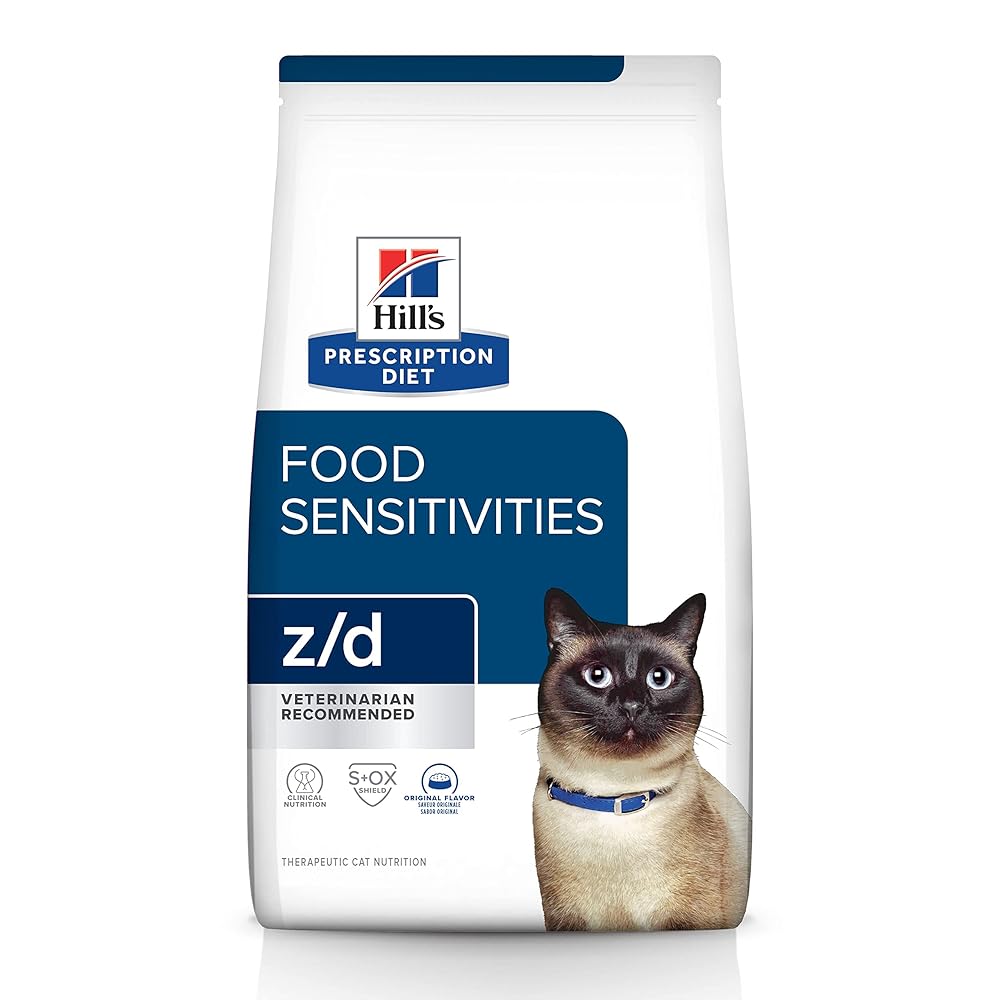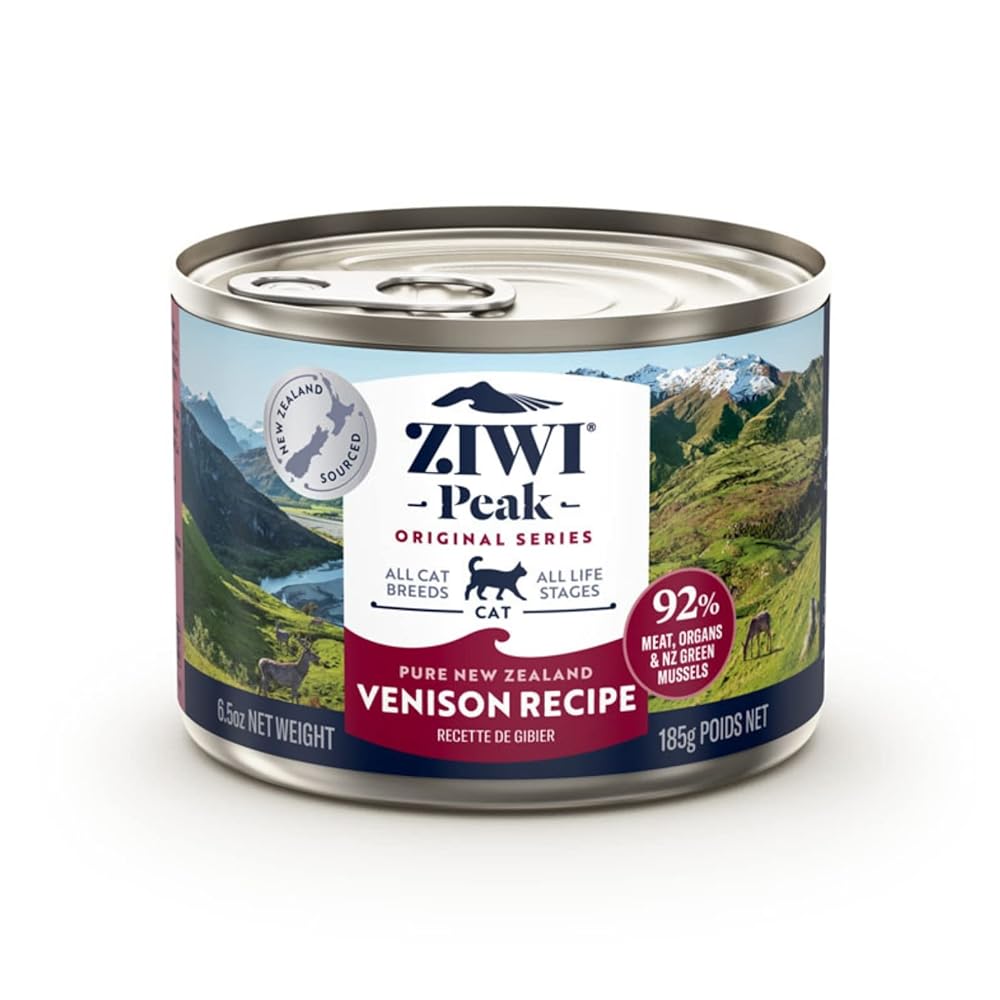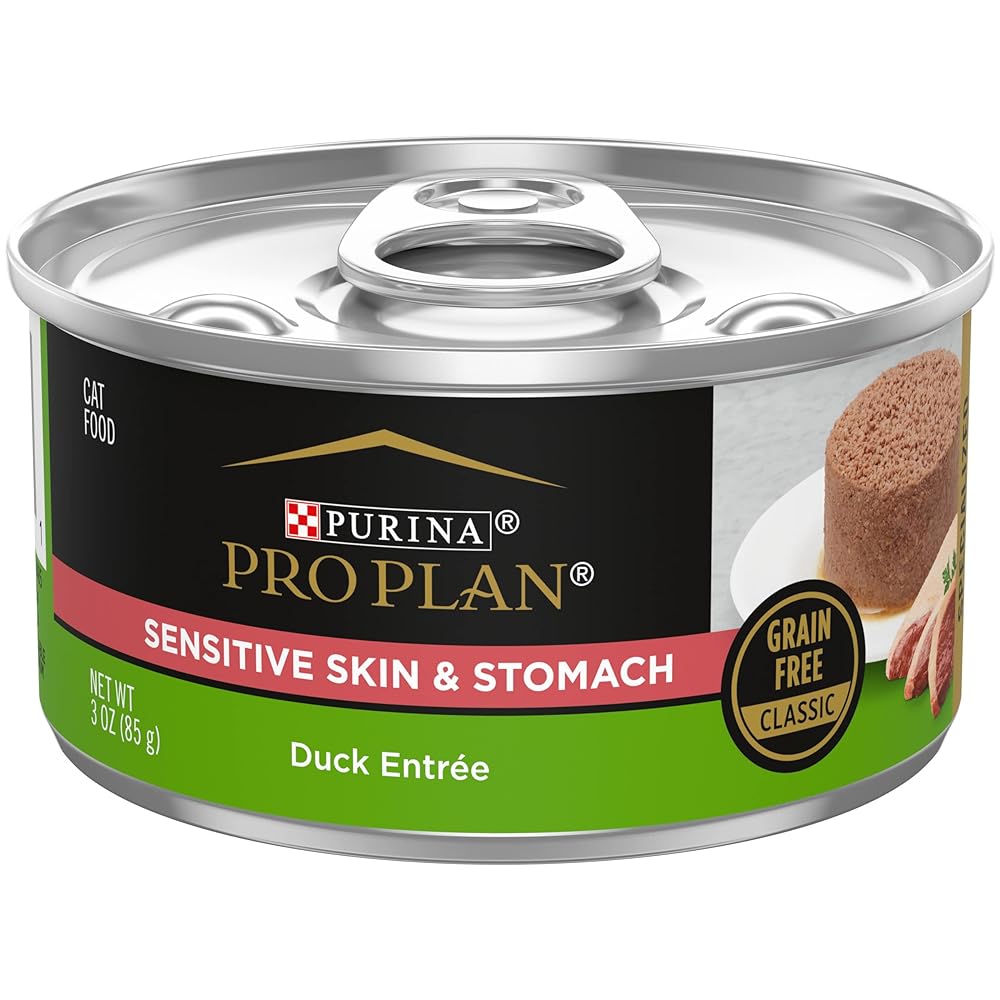iHeartCats is reader-supported. When you buy via links on our site, we may earn an affiliate commission at no extra cost to you.
For cats with allergies or food sensitivities, finding the right diet can be a challenging journey. Hypoallergenic cat foods are specially formulated to minimize the risk of allergic reactions and can be a game-changer for pet owners dealing with this issue. In this article, we will explore some of the best hypoallergenic cat foods available in the market. We’ll delve into their ingredient lists, nutritional profiles, and how they can benefit your feline friend, helping you make an informed choice for your pet’s well-being.
#1 – Blue Buffalo Basics Skin & Stomach Care Grain Free, Natural Indoor Adult Dry Cat Food, Duck & Potato 5-lb
This Blue Buffalo cat food is specially formulated for indoor adult cats with sensitive stomachs. It contains real duck as the main protein source and is grain-free, making it a suitable option for cats with gluten allergies. The formula also includes natural fiber sources for healthy digestion and BLUE’s exclusive LifeSource Bits for immune system support.
#2 – Purina Pro Plan Allergen Reducing, High Protein Cat Food, LIVECLEAR Chicken and Rice Formula – 7 lb. Bag
The Purina Pro Plan Allergen Reducing, High Protein Cat Food is a specially formulated cat food that helps reduce cat allergens by neutralizing a common allergen in cat saliva. Through over a decade of research, this cat food has been found to reduce the major allergen in cat hair and dander by an average of 47 percent in the third week of feeding. It contains chicken as the first ingredient and is fortified with live probiotics for digestive and immune health.
Best For: Allergy-prone cats and cat owners in need of cat food that reduces allergens. (best for reducing allergens)
#3 – Forza10 Wet Hypoallergenic Cat Food, Fish Flavor Canned Wet Cat Food, for Adult Cats with Allergy and Skin and Coat Conditions, 32 Pack Case of 3.5 Ounce Each
The Forza10 Wet Hypoallergenic Cat Food is a fish-flavored canned wet cat food designed for adult cats with allergies and skin and coat conditions. It is made with natural ingredients like turmeric, papaya, and pomegranate, which provide anti-inflammatory and immune-boosting benefits. This cat food is free from gluten, corn, wheat, soy, GMOs, by-products, artificial colors, and flavors for optimal digestive health.
Best For: Cats with allergies and skin and coat conditions.
#4 – Purina ONE Sensitive Stomach, Sensitive Skin, Natural Dry Cat Food, +Plus Sensitive Skin and Stomach Formula – 16 lb. Bag
The Purina ONE Sensitive Stomach, Sensitive Skin, Natural Dry Cat Food is a high-protein cat food designed for cats with sensitive systems. The formula includes real turkey as the first ingredient to support muscle strength and a healthy heart, as well as added prebiotic fiber for easier digestion. This cat food also contains calcium for strong teeth and gums, and antioxidant sources for a healthy immune system.
Best For: Cats with sensitive stomachs and skin. (best for sensitive stomachs and skin)
#5 – Hill’s Pet Nutrition Science Diet, Grain Free Dry Cat Food, Adult, Sensitive Stomach & Skin, Salmon & Yellow Pea Recipe, 13 lb. Bag
Hill’s Pet Nutrition Science Diet Grain-Free Dry Cat Food is a product designed for adult cats with sensitive stomachs and skin. The formula includes a prebiotic fiber to support digestive health and a balanced microbiome. The food is made with natural ingredients and is easily digestible, providing improved stool pickup.
Best For: Adult cats with sensitive stomachs and skin.
#6 – Instinct Limited Ingredient Diet Grain-Free Real Rabbit Recipe Natural Wet Canned Cat Food, 3 oz. Cans (Case of 24)
The Instinct Limited Ingredient Diet Grain-Free Real Rabbit Recipe Natural Wet Canned Cat Food is a grain-free cat food made with simple ingredients like a farm-raised rabbit, which is easily digestible. It is designed for cats with sensitivities and does not contain any grain, dairy, eggs, chicken, beef, fish, corn, wheat, soy, carrageenan, artificial colors, or preservatives. This wet cat food offers complete and balanced nutrition in a delicious pate texture that even picky cats will enjoy.
Best For: Cats with sensitivities or food allergies.
#7 – Natural Balance Limited Ingredient Adult Grain-Free Dry Cat Food, Duck & Green Pea Recipe, 10 Pound (Pack of 1)
The Natural Balance Limited Ingredient Adult Grain-Free Dry Cat Food is a premium cat food that follows a limited-ingredient diet philosophy. It contains duck and green peas as the main ingredients, providing essential protein, amino acids, and fiber for digestive health. This cat food is suitable for all types of cats and is formulated without grain, soy, gluten, artificial colors, or flavors.
Best For: Cats with sensitive stomachs, irritable skin, or allergies.
#8 – Hill’s Prescription Diet z/d Skin/Food Sensitivities Dry Cat Food, Veterinary Diet, 8.5 lb. Bag
Hill’s Prescription Diet z/d Skin/Food Sensitivities Dry Cat Food is a veterinary diet designed to address skin and food sensitivities in cats. Its formula, created by Hill’s nutritionists and veterinarians, aims to prevent skin and digestive issues caused by adverse food reactions. The food contains a single animal protein and carbohydrate source, as well as natural fiber to promote a healthy skin barrier and normalize stool.
#9 – ZIWI Peak Canned Wet Cat Food – All Natural, High Protein, Grain Free, Limited Ingredient, with Superfoods (Venison, Case of 12, 6.5oz Cans)
The ZIWI Peak Canned Wet Cat Food is a high-protein, grain-free cat food made with all-natural ingredients. It is formulated to mimic a cat’s natural, whole-prey diet and features 92% meat, organs, and New Zealand green mussels. The food is also free from unnecessary carbohydrates and fillers and includes healthy superfoods like green tripe, New Zealand Green Mussels, and organic kelp.
Best For: Best ingredient sourcing.
#10 – Purina Pro Plan Sensitive Skin and Stomach Wet Cat Food, Sensitive Skin and Stomach Duck Entree – (24) 3 oz. Pull-Top Cans
The Purina Pro Plan Sensitive Skin and Stomach Wet Cat Food is a highly digestible pate cat food that is made with real duck to nourish the skin and coat. It contains natural prebiotic fiber to support digestive health and includes antioxidants, vitamin A, and taurine for a healthy immune system and vision. This wet cat food is free from artificial colors and preservatives and provides essential vitamins and minerals.
Best For: Sensitive skin and stomach
What Are The Benefits of Hypoallergenic Cat Foods?
Hypoallergenic cat foods offer several benefits designed to support cats with food sensitivities, allergies, or specific gastrointestinal issues. Here are some key advantages:
- Reduced Allergic Reactions: The primary benefit is to minimize or eliminate allergic reactions, which can manifest as skin irritations, excessive scratching, or digestive issues like vomiting and diarrhea.
- Limited Ingredients: Hypoallergenic cat foods often feature limited-ingredient diets that make it easier to identify potential allergens, thus simplifying the process of elimination and reintroduction to pinpoint what might be causing allergic reactions.
- High-Quality Protein Sources: Many hypoallergenic cat foods use high-quality, novel protein sources—like duck, venison, or rabbit—that the cat has not been exposed to, reducing the chance of an allergic reaction.
- Enhanced Digestibility: These foods often contain easily digestible ingredients and may incorporate specialized fibers and nutrients that support gastrointestinal health, which is particularly beneficial for cats with sensitive stomachs.
- Skin and Coat Health: The specialized formulations often include essential fatty acids like omega-3 and omega-6, which can improve skin and coat health, a major concern for cats with allergies.
- Veterinary Formulated Options: Many hypoallergenic cat foods are veterinary-formulated or prescription-based, ensuring that they meet stringent guidelines for treating specific conditions.
- Targeted Nutrition: Some hypoallergenic cat foods are designed with additional health benefits, such as urinary tract support or weight management, making it easier to address multiple health issues concurrently.
- Improved Quality of Life: For cats suffering from chronic allergies or sensitivities, switching to a hypoallergenic diet can significantly improve their comfort and quality of life, reducing symptoms and associated discomfort.
Always consult your veterinarian for a diagnosis and personalized feeding recommendations if you suspect your cat has food allergies or sensitivities.
What Qualifies as a Hypoallergenic Cat Food?
Hypoallergenic cat food is specifically formulated to minimize the risk of allergic reactions or food sensitivities in cats. Here’s what generally qualifies a cat food as hypoallergenic:
- Limited Ingredients: These diets often feature a limited number of ingredients to make it easier to identify and eliminate potential allergens. The fewer the ingredients, the less likely the food will trigger an allergic reaction.
- Novel Protein Sources: Hypoallergenic cat foods often use unconventional or “novel” protein sources that a cat has not previously been exposed to, such as duck, venison, or rabbit. The idea is that the cat is less likely to be allergic to a protein it has never encountered.
- Grain-Free: Many hypoallergenic diets are grain-free, as some cats are sensitive to grains. However, grain-free does not automatically mean hypoallergenic, so it’s crucial to look at the entire ingredient list.
- Absence of Common Allergens: These diets avoid common allergens like beef, chicken, dairy, and fish, which are often implicated in food allergies in cats.
- Highly Digestible: Ingredients are chosen for their digestibility, as some allergic reactions can stem from a cat’s inability to properly digest certain types of food.
- Addition of Beneficial Nutrients: Often, hypoallergenic foods will include added nutrients that support skin health, such as omega-3 and omega-6 fatty acids, as skin issues are common in allergic cats.
- Veterinary Formulated or Prescription-Based: Some of the most effective hypoallergenic cat foods are available by veterinary prescription. These are formulated to meet stringent guidelines and are often used in food elimination trials to diagnose food allergies.
- Quality Control: Brands that produce hypoallergenic cat food usually adhere to strict quality control measures to prevent cross-contamination of ingredients, which is crucial for pets with severe allergies.
- Single Carbohydrate Source: Just like novel protein sources, using a single, easily digestible carbohydrate source like sweet potato can also help identify any sensitivities.
- No Artificial Additives: These foods usually avoid artificial colors, flavors, and preservatives, which can sometimes trigger allergic reactions.
It’s essential to consult your veterinarian for an accurate diagnosis and personalized feeding recommendations if you suspect your cat has a food allergy or sensitivity.
Frequently Asked Questions About Hypoallergenic Cat Foods
1. What is hypoallergenic cat food?
Hypoallergenic cat food is specially formulated to minimize the risk of food allergies or sensitivities. These foods often feature limited ingredients, and novel protein sources, and are free from common allergens to help identify and eliminate triggers for allergic reactions.
2. How do I know if my cat needs hypoallergenic food?
Signs that your cat may benefit from hypoallergenic food include chronic digestive issues, excessive scratching, or skin irritations. If you suspect your cat has a food allergy, consult your veterinarian for a diagnosis and a tailored feeding recommendation.
3. What are the common ingredients in hypoallergenic cat food?
Hypoallergenic cat foods often use novel proteins like duck, rabbit, or venison and easily digestible carbohydrates like sweet potatoes or peas. They avoid common allergens like beef, chicken, and grains.
4. Can hypoallergenic food help with my cat’s skin issues?
Yes, many hypoallergenic cat foods are formulated with nutrients like omega-3 and omega-6 fatty acids to support skin health, which can be beneficial for cats with skin allergies or irritations.
5. Is hypoallergenic cat food more expensive?
Hypoallergenic cat foods can be more expensive due to the high-quality, novel ingredients they use, as well as the research and veterinary oversight that goes into formulating them.
6. Can I make homemade hypoallergenic cat food?
While it’s possible to make homemade hypoallergenic cat food, it’s crucial to consult a veterinarian or a veterinary nutritionist to ensure the homemade diet is balanced and suitable for your cat’s specific needs.
7. Can kittens eat hypoallergenic cat food?
Yes, hypoallergenic cat food is generally safe for cats of all ages, including kittens. However, consult your veterinarian for specific feeding recommendations tailored to your kitten’s unique nutritional needs.
8. Do hypoallergenic foods require a prescription?
Some hypoallergenic cat foods are available over the counter, while others require a veterinary prescription. Prescription diets are often used for elimination diets to diagnose food allergies.
9. Are grain-free foods also hypoallergenic?
Not necessarily. While many hypoallergenic foods are grain-free, being grain-free does not automatically make a food hypoallergenic. Other ingredients can still cause allergies or sensitivities.
10. How long does it take to see improvements after switching to hypoallergenic food?
It can take several weeks to a few months to see improvements in allergic symptoms after switching to a hypoallergenic diet. Always consult your veterinarian for an accurate diagnosis and ongoing management of food allergies.
Conclusion: Best Hypoallergenic Cat Foods
Navigating the world of hypoallergenic cat foods can be overwhelming, but the right diet can make a significant difference in your cat’s quality of life. The products highlighted in this article offer a range of options to suit different needs, from limited-ingredient diets to prescription formulas. Remember, every cat is unique, and what works for one may not be suitable for another. Always consult your veterinarian for a diagnosis and personalized advice on managing allergies and food sensitivities in your cat. Armed with this information, you are now better prepared to make a choice that will contribute to your cat’s long-term health and comfort.

